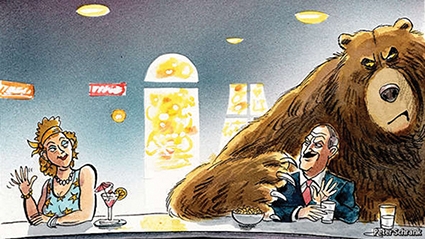Playing by the Rules: Belarus vs Russia
The president of Belarus, Alexander Lukashenko, last week criticized Russia in a meeting with representatives of the public, Belarusian and foreign mass media, stressing that Belarus' economy can survive the current pressure the Russian authorities are applying.
He went on, however, to ask that Russia not create problems for Belarusian producers as a way to try and make Minsk pay Russia for gas and oil.
"I want to know how to act tomorrow, because we have to pay you (Russia) for energy, and if we cannot get a penny in Russian and other markets, we cannot pay for oil and natural gas," Lukashenko said at a meeting with the Kostroma (Russia) region governor, Sergey Sitnikov.
Yet, in spite of the traditional emotional speech of Lukashenko, it was clear that the Belarusian leader was nervous. And here's why: the Belarusian economy has serious problems, particularly with sales in the traditional Russian market.
As the modern economic model of the country largely ensures the safety of the political regime headed by Lukashenko, and clearly not wanting to go through painful reforms which may significantly affect the social situation of citizens, Lukashenko wants to use the established track. This implies large discounts from the Russian side on Belarusian products in exchange for the energy supplied by the republic.
The desire for neutrality in Belarus is inconsistent due to its military-political union with Russia and Moscow is now demanding to know why, in exchange for oil and gas exports, it must lose profits. And it is not satisfied with a situation which sees it ensuring the stability of the Belarusian economy, but not receiving the expected dividends in the political sphere- with Minsk openly demonstrating its unwillingness to share sovereignty. It is no coincidence that Belarus, together with Kazakhstan, are the leaders in the Eurasian Economic Union (EEC), hindering the integration processes within that Union.
Moscow's ability to put pressure on Astana is significantly less than that it can apply to Minsk. As such, the Russian authorities decided to start with Belarus to show that the rules of the game have changed, and clearly demonstrating that it (Russia) will be helping no-one. This, not only because of a lack of resources, but also due to changes in foreign policy.
Judging by the statements of Lukashenko, however, he has no desire to put up with this new reality. And he does not understand why the traditional methods in Belarusian relations with Russia no longer work as before. After Ukraine, Moscow has no fear of relations with the West, nor of an increase in tariffs for transit of Russian oil, or equivalent boycotts at summits and meetings.
Therefore, the Russian authorities, without emotional statements in the style of Lukashenko, have moved to show their hand has changed and they are confident they will beat Belarus. For example, a few hours after an order from Lukashenko that the Belarusian Ministry of Internal Affairs start a criminal case against the head of “Rosselkhoznadzor,” Sergey Dankvert, Russia banned the supply of beef products from Minsk.
At the same time, the Russian authorities emphasize that they expect Belarus to repay its gas debt in full and at a price which is specified in the contract and not which is identified by their Belarusian colleagues.
The Russian authorities are well aware that Minsk cannot escape. An IMF loan is capable of solving the financial problems of the country for the short-term but, like Ukraine, no one will be supporting Belarus in its long-term fight against the bear. What’s more, no one can replace the Russian market for Belarusian manufacturers.
It can be expected that in the near future, Lukashenko will find a compromise with the Russian authorities. But in any case he will have to come to terms with the new reality and realize that if he wants to continue to maintain the current political model in Belarus, he must analyze the interests of Russia and play by its rules and its rules alone.
Dimitri Dolaberidze
Source: Peter Schrank/The Economist











